

Rory McGreal, Athabasca University, Canada
Micro-credentials (MCs) have emerged as a transformative tool in education and workforce development, offering flexible, targeted learning opportunities that align with the principles of lifelong learning. This paper presents the findings of a survey conducted among stakeholders in the Commonwealth Caribbean in a baseline study to gauge their awareness, experiences, and attitudes toward MCs. The study reveals that while a majority of respondents are familiar with MCs, significant barriers such as lack of awareness, resistance to change, and limited access to technology hinder their widespread adoption. The paper highlights the potential of MCs to address regional flexible learning and skills gaps, support workforce development, and promote social inclusion, while also emphasizing the need for clear policies, quality assurance frameworks, and stakeholder collaboration. By applying the Lifelong Learning Paradigm, the paper provides a comprehensive framework for understanding the role of MCs in supporting continuous learning, skill development and adaptability. The findings underscore the importance of aligning MCs with industry needs, leveraging technology, and fostering a supportive ecosystem to ensure their successful implementation in the Caribbean. The paper concludes with actionable recommendations for policymakers, educators, and employers to integrate MCs into the region’s lifelong learning landscape.
Keywords: Caribbean, labour force, micro-credentials, policies, sustainable development
Les micro-crédits (MC) sont apparus comme un outil de transformation dans l'éducation et le développement de la main-d'œuvre, offrant des possibilités d'apprentissage flexibles et ciblées qui s'alignent sur les principes de l’apprentissage tout au long de la vie. Ce document présente les résultats d'une enquête menée auprès des parties prenantes dans les Caraïbes du Commonwealth dans le cadre d'une étude de référence visant à évaluer leur connaissance, leurs expériences et leurs attitudes à l'égard des microcrédits. L'étude révèle que bien que la majorité des personnes interrogées soit familiarisée avec les MC, des obstacles importants tels que le manque de connaissance, la résistance au changement et l'accès limité à la technologie empêchent leur adoption à grande échelle. Le document met en évidence le potentiel des MC pour combler les lacunes régionales en matière d'apprentissage flexible et de compétences, soutenir le développement de la main-d'œuvre et promouvoir l'inclusion sociale, tout en soulignant la nécessité de politiques claires, de cadres d'assurance qualité et d'une collaboration entre les parties prenantes. En appliquant le paradigme de l'apprentissage tout au long de la vie, ce document fournit un cadre complet pour comprendre le rôle des MC dans le soutien à l'apprentissage continu, au développement des compétences et à l'adaptabilité. Les résultats soulignent l'importance d'aligner les MC avec les besoins de l'industrie, de tirer parti de la technologie et d'encourager un écosystème favorable pour garantir leur mise en œuvre réussie dans les Caraïbes. Le document se termine par des recommandations concrètes à l'intention des décideurs politiques, des formateurs et des employeurs afin d'intégrer les MC dans le paysage de l'apprentissage tout au long de la vie de la région.
Mots-clés : Caraïbes, main-d'œuvre, micro-crédits, politiques, développement durable
In an era of rapid technological advancement and evolving labour market demands, the need for flexile and continuous learning and skill development has never been more critical. Traditional education systems, while foundational, often struggle to keep pace with the dynamic developmental needs of industries and individuals. Micro-credentials (MCs) have emerged as a promising solution, offering flexible, targeted learning opportunities that enable individuals to acquire new skills and knowledge throughout their lives. Rooted in the principles of lifelong learning, MCs provide a pathway for upskilling, reskilling, and personal development, making them particularly relevant in the context of the Commonwealth Caribbean, where economic diversification and workforce readiness are pressing priorities (OECD Development Centre, & Inter-American Development Bank, 2024).
The Commonwealth Caribbean comprises 12 of the 20 small island developing countries in the Anglophone Caribbean Community (CARICOM) region. The Caribbean Examinations Council (CXC®), the Commonwealth of Learning (COL), and other organizations have recognized the importance of MCs (Commonwealth of Learning, 2024). With the desire to impact educational transformation in CARICOM as a whole, CXC® and COL structured an intervention to explore policy, application, and capacity development of MCs in all levels of education and training in the Commonwealth Caribbean region (Ali, 2023a; Commonwealth of Learning, 2024). Micro-credentials are generally defined as attestations of educational interventions lasting one semester or less, typically less than 45 hours, with some consisting of one or a few lessons of short duration (Ali, 2024). Micro-credentials are typically used to assess specific competencies or outcomes, providing successful learners with accreditation.
The Commonwealth Caribbean has distinct socio-economic, environmental, and educational challenges which it must address through educational transformations and so stands to benefit significantly from the adoption of MCs (CARICOM, 2017). However, the region’s readiness to embrace this innovative approach to learning needs to be explored. This paper seeks to address this gap by presenting the findings of a survey conducted among key stakeholders, including educational administrators, faculty, and government officials, to assess their awareness, experiences, and attitudes toward MCs. The study aims to provide a comprehensive understanding of the current state of MCs in the region, identify barriers to their adoption, and propose strategies for their effective implementation.
The Lifelong Learning Paradigm serves as the conceptual framework for this study, emphasizing the continuous, flexible, and inclusive nature of learning. By framing MCs within this paradigm, the paper highlights their potential to support personal development, social inclusion, economic competitiveness, and active citizenship.
The Lifelong Learning Paradigm is a comprehensive framework that supports accessibility and the flexible and inclusive nature of learning during the entirety of the learner’s life (Kodhandaraman et al., 2011; Terziev, 2019). This provides a strong theoretical foundation for interpreting the survey data and for making evidence-based recommendations. This conceptual framework includes learning in various contexts and formats. UNESCO has defined lifelong learning as being for all levels of education, all age groups, all modalities, and all spheres and spaces. It is considered to be an investment in human capital contributing to economic growth and social development. This framework provides a rationale that is particularly appropriate for MCs, which enable people to acquire new knowledge and valuable skills throughout their lives. Micro-credentials can serve as an essential factor in addressing the region’s skills gaps, supporting workforce development, and promoting accessibility and inclusion. This framework undoubtedly enhances the relevance and impact of MCs, within a policy setting, while supporting the learning and workforce needs of the Caribbean (UNESCO, 2020).
A hybrid response survey instrument for collecting responses on the attitudes of critical educational stakeholders (education policy architects, education professionals, and others) towards MCs was created by the author and circulated by both the CXC® and the COL to regional education stakeholders. The survey comprising closed- and open-ended items underwent revisions based on feedback received from these two organizations. The survey was administered by COL via its website and by CXC® where approximately 300 Commonwealth Caribbean stakeholders identified were emailed for participation in the survey. Ultimately, a survey response rate of 52% was obtained, there being 157 responses, of which only 112 contained partial or complete data. The purpose of this survey was to gauge stakeholders' awareness and interest in, as well as their knowledge of and potential experience with, micro-courses, including their expressed concerns.
This paper consists of a survey, which formed one section of a report1 to CXC® and COL. The comments from respondents, which have been categorized and summarized for clarity, provide the most valuable insights.
The survey primarily gathered responses from educational administrators and managers, who formed the majority of participants, followed by faculty and instructors. Most respondents were affiliated with governmental ministries, organizations, and tertiary education institutions. A significant portion of the respondents were veteran employees with over 10 years of experience in the education sector, with a female majority reflecting regional employment trends in education. Notably, the response rate did not align with the population sizes of the countries in the region. For instance, Saint Lucia, despite being much smaller than Jamaica, had more respondents, while Guyana garnered substantially more responses than other countries. This highlights the need for tailored strategies for the different countries in the region.
Figure 1
Respondents by Organization (N=112)
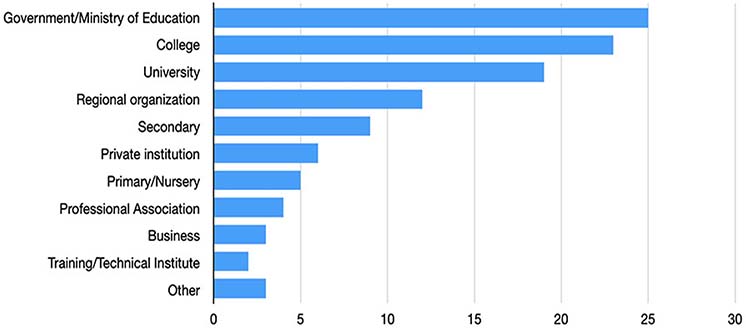
Figure 2
Years of Experience in the Organization (N=112)
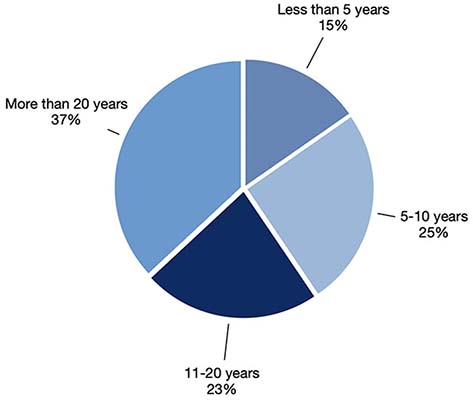
Figure 3
Respondents by Gender (N=112)
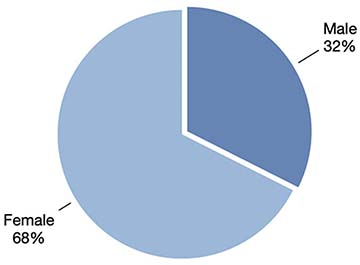
Figure 4
Country of Residence (N=112)
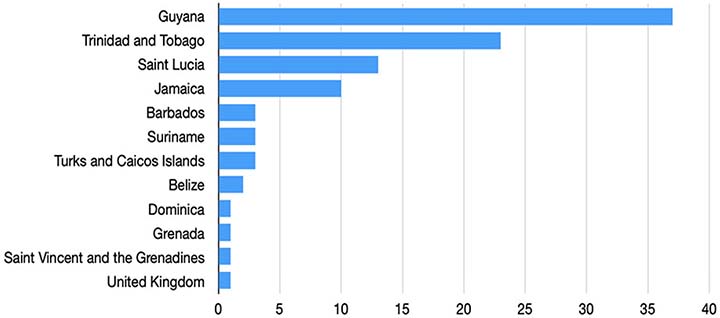
The majority of respondents were aware of MCs even though this term is not commonly used to describe the credentials offered for short courses in the region (Q2).
Figure 5
Response to Q2. Have you heard of micro-credentials before taking this survey? (N=112)
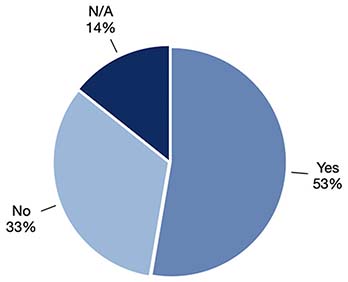
Most respondents (66%) had some familiarity with MCs, but the greater number of these were only somewhat or moderately familiar. At least a third noted that they had no awareness of MCs (Q3).
Figure 6
Response to Q3. How would you rate your familiarity with micro-credentials? (N=112)
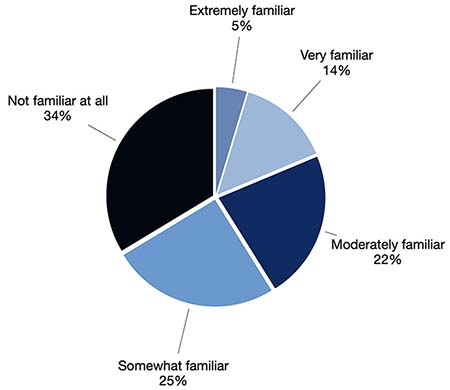
No country stood out as being more or less familiar (Q4). Unsurprisingly, the respondents indicated that they primarily learn about MCs through social networking. Professional associations and institutional websites are also important sources of information.
Figure 7
Response to Q4. What sources do you use to learn about new educational opportunities? (Check all that apply) (N=112)

Short courses in the Caribbean have been available for many years, predating the term "micro-credential," which has become familiar to educators. Half of the respondents reported having more than 10 years of experience in this regard (Q5).
Figure 8
Response to Q5. What is your experience with micro-credentials? (N=112)
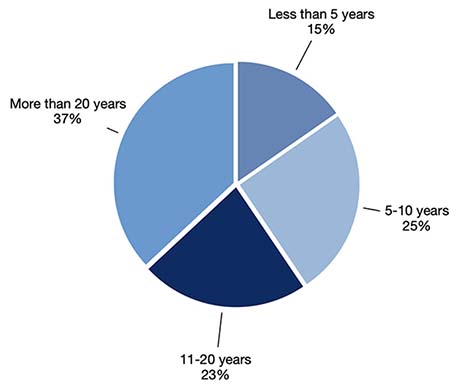
While 32 respondents stated that they had never been involved in developing or delivering short courses or programs, a large majority (80) had this experience, some going back many years (Q62). Unsurprisingly, the motivation for creating short courses was primarily top-down from the administration in order to meet industry demands and/or generate new revenues. Personal interest was also an important factor (Q7).
Figure 9
Response to Q7. If yes, what motivated you to develop a short course or programme? (Check all that apply) (N=112)

Note. The validation of this information from industry was not part of this exercise.
In response to participants struggling to complete a 12-hour course, the material was restructured into smaller, more manageable mini-courses, each ranging from 5 to 15 minutes. The experience in developing standards and guidelines for the quality assurance of MC learning products informed this decision. Mini courses were designed to address specific skills that are occasionally required on the job, such as learning new procedures or technologies, ultimately enhancing productivity.
Overwhelmingly, the experience of practitioners has been positive (Q8).
Figure 10
Response to Q8. If yes, what was your overall experience with the short course? (N=32; Yes=80)
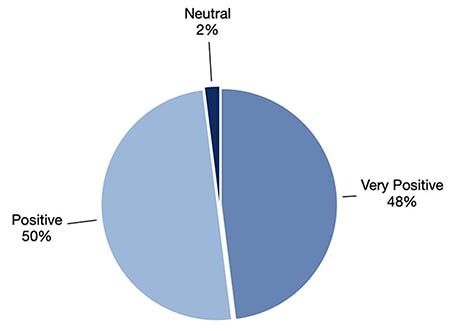
Q9. Describe your experience and the impact on your work. According to respondents, engaging in the design and development of MCs has provided significant professional growth and enhanced skill sets (80=YES). Creating digital media courses tailored to specific age groups has allowed for curricula that can be both age-appropriate and relevant to immediate educational needs. Through this process, at least one respondent learned to quickly build knowledge on administrative and personal interests, making micro-courses particularly pertinent and practical. From an organizational perspective, this experience has deepened an instructor’s understanding of industry needs and strategies, fostering networking and improving the ability to identify and bridge skill gaps.
Other respondents incorporated MCs into a thesis; proposed learning pathways for lecturers to acquire skills in virtual reality (VR); and facilitated the transition of college lecturers to VR, enhancing their teaching methods and improving student engagement. The practical aspects of VR area were thoroughly covered, including hands-on training that was both extensive and highly focused.
Facilitating Continuous Professional Development (CPD) programmes for the Ministry of Education in Guyana has also been a transformative experience. These five-day programmes, spanning 20 to 30 hours, were highly effective in addressing the day-to-day challenges faced by teachers. The training sessions were structured to provide practical solutions, ensuring that teachers could immediately apply what they learned to improve their teaching efficacy. This experience has reinforced the value of targeted, short-term professional development programs leading to MCs.
Taking MCs has been a boon for acquiring new skills and knowledge quickly and efficiently. These courses are designed to be short and to the point, providing immediate, actionable insights that can be implemented. They have also equipped instructors with skills applicable to both job-related tasks and external pursuits such as research and consulting. The best MCs employ flexible delivery modes, robust assessment and evaluation methods, and are directly relevant to contemporary industry needs. They condense quality learning objectives into manageable, bite-size pieces, offering certification within a short period. This approach not only meets the needs of adult learners but also ensures immediate upskilling and improved output quality.
Micro-credentials have provided just-in-time new skills that are essential for productivity and efficiency. When faced with the challenge of low completion rates for a 12-hour course, it was broken down into smaller 5 to 15-minute mini-courses, which significantly improved completion rates. The bite-sized nature of these courses made them easier to integrate into daily routines. Access to ongoing professional development and curriculum content through flexible delivery and assessment provisions has been immensely beneficial. These MCs offered helpful, short-term training opportunities that increased productivity by addressing specific job-related needs, such as new technologies or procedures.
Developing a short course in Electrical Installation to upskill Electrical and Electronic Technology Teachers for the Revised curriculum in 2015 was another impactful initiative. From an organizational standpoint, this initiative helped in understanding the organization's needs, facilitating networking, and enhancing the ability to identify and address skill gaps. As both a beneficiary and benefactor, micro-credentialing has enabled the leveraging of the core competencies of various institutions on local, regional, and international levels.
Certification through MCs has played a critical role in professional development and mobility. This college offers customized training in areas such as pumps, valves, and home care nursing, benchmarked to international standards where possible. While these courses are certified by the college, there is a growing demand for international certification and foreign accreditation, underscoring the value of recognized credentials. Such certifications ensure that the skills and knowledge acquired are validated, enhancing their worth in the job market and contributing to professional advancement.
Standards and guidelines for MC learning products accepted across the Jamaican education sector have informed the development of various types of MCs, whether for upskilling, reskilling, or as components of full qualifications (University Council of Jamaica, n. d.). They aim to increase flexibility in integrating MCs into existing programme portfolios, expanding capacity to meet industry needs. Additionally, the guidelines advance competency-based practices, ensuring that learning outcomes are met. This well-articulated framework for the design, development, and delivery of MCs ensures they meet established standards, enhancing their credibility and effectiveness in professional development.
Despite the many benefits of MCs, not everyone has engaged with them. Some individuals have never enrolled in or used MCs, opting instead for other types of courses to enhance their knowledge. Others are not familiar with the term or have not researched it prior to completing surveys. This indicates a need for greater awareness and education about the advantages of MCs. Despite these gaps, those who have utilized MCs overwhelmingly report positive experiences.
Micro-credentials can be seen as targeting a different market than the traditional one. This can present significant challenges. Intensive research and trials are required, which may not always be feasible with existing staff. This highlights the need for dedicated resources and strategic planning to effectively explore new market opportunities. Balancing the demands of current operations with the pursuit of new market segments necessitates careful consideration and often additional support to ensure successful implementation and outcomes.
Even with no experience, respondents showed a willingness to work with micro-credentials (Q10).
Figure 11
Response to Q10. If no, then would you be willing to work with micro-credentials in your field? (N=32)
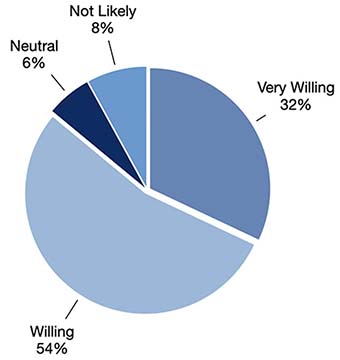
Among the respondents a large majority agreed or strongly agreed that MCs could strongly enhance the quality of education (Q11).
Figure 12
Response to Q11. To what extent do you believe micro-credentials can be implemented to enhance the quality of educational content and curricula? (N=112)
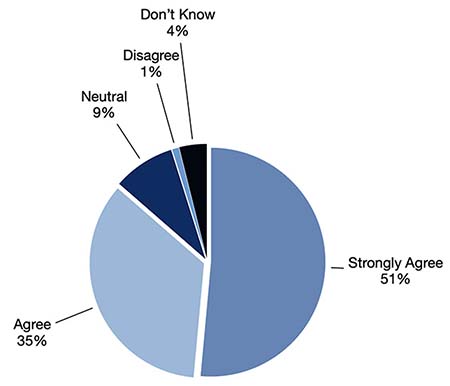
The principal advantages of micro-credentials were recognized by a majority of the respondents, with the greatest agreement on course customisation and accessibility to learning materials (Q12).
Figure 13
Response to Q12. In your opinion, what are the main advantages of incorporating micro-credentials in your educational environment? (Choose up to 3) (N=112)
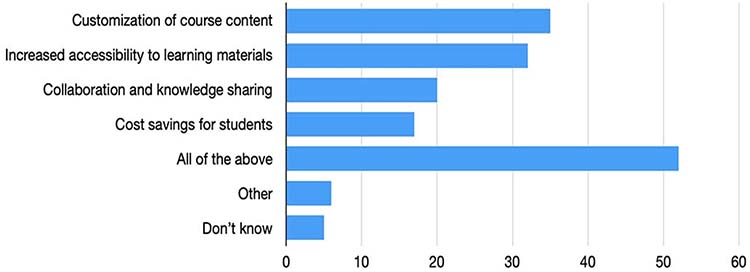
Respondents chose lack of awareness more than credential acceptance and resistance to change at their institutions as principal challenges. Quality concerns were also considered important. Alignment with goals was not considered to be as important; and concerns about the quality of the MCs, as well as their alignment with organizational goals were less commonly expressed challenges (Q13).
Figure 14
Response to Q13. What challenges do you foresee in the adoption of micro-credentials within your institution? (N=112)
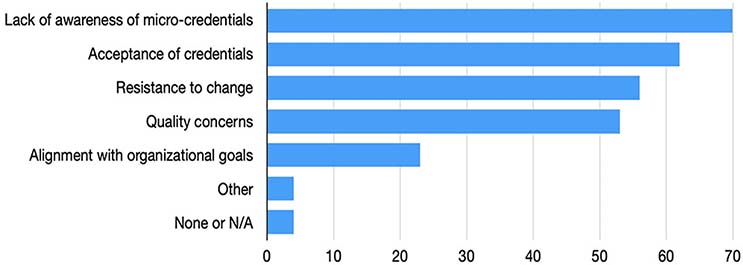
Not surprisingly, because few institutions had policies or guidelines, so respondents were not aware of any (Q14).
Figure 15
Response to Q14. Are you aware of any existing policy, guidelines or initiatives regarding the use of micro-credentials at your (or another) organization? (N=112)
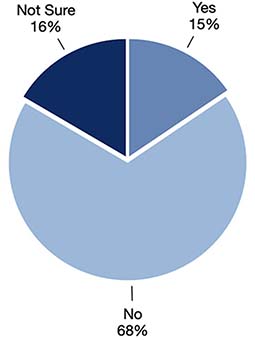
Currently, a committee is collaborating with a training agency on micro-credentialing initiatives. While some organizations do not enforce micro-credentialing, others do. Micro-credentials have been present since the introduction of CXC® exams. Although policies exist for developing programs, including short courses, the term "micro-credential" is not explicitly mentioned. There is an approved procedure for certified special and short courses. The COL, in collaboration with national instructors developed an education leadership program, which included three short courses delivered over nine weeks, equivalent to approximately 3.5 undergraduate academic credits. Additionally, UNESCO and its specialized institute, UNESCO IIEP, have published policy guides on micro-credentials, offering blueprints for policy development and action.
The majority of respondents (72%) felt that MCs could be effective, with only one respondent finding that they were ineffective (Q15).
Figure 16
Response to Q15. If yes, how would you rate its effectiveness in promoting the use of micro-credentials? (N=112)
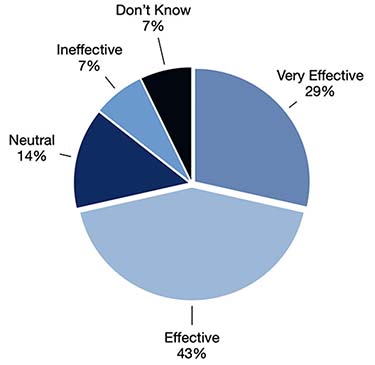
Q16. Opinions on expanding the use of micro-credentials in your institution or organization.
Raising awareness about the value and importance of MCs is crucial. Currently, the focus should be on initiating efforts rather than expanding existing ones. It is essential to begin sensitizing educators about the benefits of MC programs, combining awareness initiatives with pilot programs, and staggered rollouts for optimal impact. Government involvement is necessary to promote micro-credentialing, emphasizing its validity, application, and acceptance both locally and internationally across all programs, including the visual and performing arts. Enhancing communication with stakeholders about the quality, relevance, and practical benefits of MCs is also vital. Ensuring greater awareness and access to these programs is essential for their success.
Efforts should be directed towards improving public awareness through social media, schools, and stakeholders, utilizing forums, seminars, workshops, and brochures. It is important to educate employees and management about MCs, highlighting their value for professional development and career growth. Increasing communication with potential clients can create demand, justifying the expansion of these courses, especially in private sector colleges.
Providing a robust support system and incentives for individuals pursuing MCs is essential. This includes allocating time for teachers to complete courses, balancing institutional responsibilities. Implementing a reward system for completing MCs, such as a point system for recognized certifications, can motivate individuals. Linking MCs to opportunities for advancement, recognition, or benefits like sabbaticals and sponsored trips can further encourage participation. Institutions could also offer employees the opportunity to do short online courses.
Integrating MCs within existing programs is crucial for their success. Incentives like time-off for face-to-face events and workshops on the benefits of MCs can motivate participation. Establishing committees to design courses and a dedicated unit for producing MCs is necessary. Training faculty, staff, and administrators on the development and implementation of MCs is essential. Aligning MCs with specific industry skills and offering them to local and regional business employees can enhance their relevance. Promoting MCs early and ensuring their quick acceptance is important for their widespread adoption.
Policy. Developing clear public and organisational policies for the development and quality assurance of MCs within existing guidelines is essential. Establishing policies for the acceptance of MCs in promotions and career advancements can encourage their uptake. These policies should outline the rules and guidelines for micro-credentialing, ensuring their integration into the broader educational framework.
Access to Learning. Improving accessibility and awareness of programs, content, and qualified coaches is called for. Addressing barriers to accessing these programs, especially for top management, by demonstrating financial feasibility and cross-border benefits, can increase participation.
Cost. Acknowledging the high costs of hiring external coaches is important, as it can make programs less attainable for most individuals. Demonstrating the financial feasibility of these programs, especially to top management, can help in securing necessary resources.
Other Comments. Creating an organization to provide MC workers on a stipend, like internship programs, can ensure competency and facilitate job placements. Significant effort is required to implement these programs, including orientation workshops for better understanding. Institutions could consider leveraging past models and splitting syllabi into parts to offer continual certification opportunities. Ensuring MCs are recognized in appointments and promotions by providing credits for additional points can encourage participation. Including MCs as part of the criteria for job evaluations and promotions can further validate their importance.
Respondents, by a wide margin, agreed that their institutional leaders are very supportive of micro-credentials (Q17).
Figure 17
Response to Q17. How supportive do you believe your organization’s leadership is regarding the implementation of micro-credentials? (N=112)
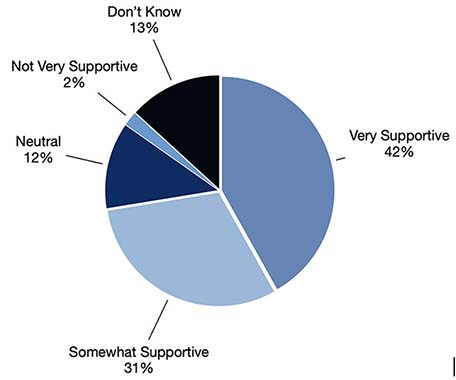
In contrast to the belief in the support that institutional leadership has for MCs, few institutions have provided training. Unsurprisingly, the countries with the most respondents also show the most respondents who have received training in MCs (Q18).
Figure 18
Response to Q18. Have you received any training or support related to micro-credentials from your institution? (N=112)
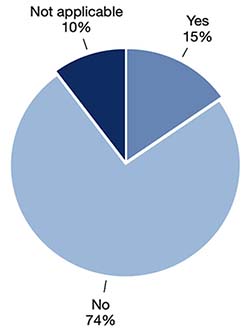
Of the 15 respondents who received training, 80% found it effective, with only one person believing that their training was ineffective (Q19).
Figure 19
Response to Q19. If yes, how would you rate the effectiveness of the training or support provided? (N=15)
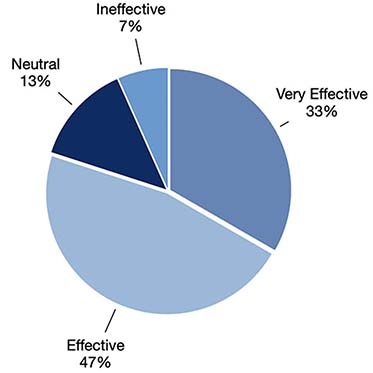
Micro-credentials offer significant benefits for the Caribbean region by providing targeted, specific skill sets that improve employee productivity. These certifications enable workers to quickly gain relevant skills without the need for extensive in-house training, thereby offering an economic advantage to businesses. Companies can save on training costs while ensuring their employees current with the latest industry standards and practices. Promoting MCs as a cost-effective solution can help businesses recognize their value in maintaining a competitive edge in the market.
Awareness Campaign. A regional awareness campaign could highlight the value and utility of MCs. By leveraging marketing strategies, information sessions, and success stories, such a campaign can underscore the advantages of MCs for career advancement and lifelong learning. Sharing real-life examples of individuals who have benefited from these certifications could be used to inspire others to pursue similar pathways, ultimately creating a more skilled and adaptable workforce.
Increased Publicity of Its Credentials. Enhancing the publicity of MCs involves strategic efforts to make their value widely recognized throughout the region. This can include publishing articles in industry journals, presenting at conferences, and partnering with professional associations. By increasing visibility, these credentials can become mainstream, leading to greater acceptance and integration within various industries.
Advertisements and Marketing. Utilizing regional advertisements and marketing, particularly through influencers and social media, can also be used to significantly boost the reach and appeal of MCs. Influencers can share their positive experiences and success stories, while targeted ads can reach potential learners. Social media platforms provide an interactive space to engage with audiences, answer questions, and build a community around micro-credentialing.
Student Engagement and Feedback Sessions. Engaging students through feedback sessions is essential for understanding their needs and improving the micro-credentialing process in participating countries. These sessions can provide insights into what students find valuable and what areas need enhancement. By involving students in the development and refinement of these programs, educational institutions can ensure that the offerings remain relevant and effective.
Stakeholder Collaboration. Engaging key stakeholders, including educational institutions, employers, and government bodies, is critical to ensure that MCs meet regional labour market needs and are recognized as valid qualifications. Collaboration can help align these programs with industry standards and ensure that they are valued by employers. Stakeholders can work together to create a supportive standards-based ecosystem that promotes the adoption and success of MCs enabling regional labour mobility.
Need for Upskilling and Reskilling. Given the rapid pace of change in the modern workforce, there is an even greater need for upskilling and reskilling. Micro-skilling offers new avenues for individuals and organizations to adapt and develop resilience in the face of change. These flexible learning opportunities enable workers to stay current with emerging trends and technologies, ensuring they remain competitive and capable in their roles.
Educate, Train, and Promote. Education and training are fundamental to promoting the benefits of MCs. Conducting region-wide public education initiatives, such as webinars and professional development sessions, can spread awareness and understanding. Training sessions with regional bodies and institutions can help implement these programs effectively. Change management initiatives can ensure that new elements are integrated into existing systems, encouraging participants to apply what they have learned.
Public Education and Training. Webinars, professional development sessions, and other strategies with key educational personnel can play a pivotal role in public education and training. These platforms provide a space for detailed discussions on the benefits of MCs, best practices for implementation, and success stories. Sharing this knowledge can drive interest and participation in MC programs.
Online Course Availability. Increasing the availability of online courses can make MCs more regionally accessible to a broader audience. Online platforms offer flexibility for learners to study at their own pace and from any location. This accessibility is especially important for those balancing work, family, and other commitments, making it easier for them to pursue further education and skill development.
Strategic Communication. Strategic communication of related concepts and stakeholder feedback via social media and websites can enhance the promotion of MCs. By maintaining a consistent and informative online presence, educational institutions and organizations can keep potential learners informed and engaged. Feedback mechanisms can also help continuously improve the offerings and address concerns or suggestions from stakeholders.
Alignment with Compensation. Aligning MCs with compensation rates involves establishing a framework that recognizes and rewards the successful completion of these certifications at a regional level. Awareness campaigns and marketing strategies are essential to communicate the value of MCs in terms of financial and career growth. This alignment can incentivize workers to pursue these qualifications, knowing that their efforts will be financially acknowledged.
Financial Incentives. Offering financial incentives, such as scholarships, grants, or reduced tuition fees, can encourage enrollment in micro-courses, particularly among underrepresented groups. These incentives make education more accessible and attractive, helping to bridge the gap between skilled labor demands and the available workforce.
Integration with Traditional Degrees. Creating regionally accredited learning pathways that allow MCs to ladder towards traditional degrees can enhance the appeal of MCs. Such regional integration provides a clear and progressive educational trajectory for students, making it easier for them to pursue higher qualifications while gaining practical skills along the way.
Promotion and Endorsement by Institutions. Leading regional institutions need to endorse and promote MCs to build confidence among employers and training institutions. Greater sensitization and forums involving post-secondary and Technical and Vocational Education and Training (TVET) institutions can foster broader acceptance. Partnerships with renowned regional and international institutions can further legitimize these certifications, making public buy-in more achievable.
Linkages with Renowned Institutions. Forming linkages with renowned regional and international institutions can accelerate the acceptance of MCs. If local institutions offer these programs in collaboration with prestigious partners, it lends credibility and increases their perceived value. This approach can also facilitate the transfer of best practices and standards, enhancing the overall quality of the offerings.
Foundation for Other Courses. Making MCs a foundation for programmes and offering credits for them at regional universities and colleges can encourage enrolment. This strategy can not only add value to the credentials themselves but also could create a seamless educational pathway for students to advance their knowledge and careers.
Employer Acceptance. There is little understanding of MCs among regional employers, so improving the acceptance of MCs among them is crucial. If employers recognize and value these certifications in their hiring and employee development processes, it will drive greater interest and participation. Demonstrating the practical benefits of MCs in real-world job performance can help achieve this acceptance.
Role of Accreditation Bodies. Regional and national quality assurance and accreditation bodies should play a more active role in recognizing and incorporating MCs into the academic stream. Learning from successful models in Europe and North America can provide valuable insights. Standardizing these credentials across the region can ensure their portability and acceptance, facilitating the mobility of learners.
Regional Policy and Market Strategy. Developing a regional policy document and market strategy for MCs can provide a clear framework for implementation. Training stakeholders on these policies and promoting them widely can help ensure consistent standards and practices across institutions and employers.
Quality Assurance Structures. Establishing robust quality assurance structures, recognition agreements, and trust networks is essential for the credibility and acceptance of MCs. These mechanisms ensure that the credentials are respected and valued across different sectors and regions, promoting learner mobility and confidence in the qualifications.
Resource and Accessibility Considerations. Ensuring access to the Internet and suitable devices is critical for the successful completion of MC courses. Investments in regional infrastructure and resources can bridge the digital divide, making these learning opportunities accessible to a wider audience. Providing training on navigating learning resources and applications can also support learners in their educational journey.
Budgeting for Promotion. Increased budgeting for the promotion and advancement of MCs is necessary. Allocating funds for marketing, outreach, and resource development can enhance awareness and participation. Making these programs affordable and accessible to a diverse population ensures that more people can benefit from them.
Affordability and Accessibility. Providing affordable and accessible modes of acquiring MCs can meet the needs of a wide spectrum of people across the region. Offering flexible payment options, subsidies, or sliding scale fees can remove financial barriers, allowing more individuals to pursue these valuable qualifications.
Multi-Stakeholder Approach. A multi-stakeholder approach to public education and awareness is essential for the effective design and delivery of MC content in the participating countries. Engaging various levels of the educational ecosystem, from policymakers to industry partners, ensures that programs fill existing and future knowledge gaps. Collaboration with industry and educational institutions can create flexible learning pathways and meet competency requirements, making the experience rewarding for all parties involved.
Stakeholder Buy-In. Ensuring that key stakeholders buy in and accept their roles is crucial for a smooth transition to the use of MCs. This collaborative effort can align goals, resources, and expectations, fostering a supportive environment for learners and enhancing the overall success of these programs.
This investigation demonstrated the importance of a multifaceted approach. The findings emphasize the need for targeted educational efforts, clear communication, and ongoing support. The participatory nature of the process, from the survey, ensured that any resulting MC initiative will be well-informed, more widely accepted, and aligned with the unique needs and challenges not only of CXC®, but of the Commonwealth Caribbean educational ministries. Continuous evaluation and adaptation will be crucial for the successful acceptance, implementation, and sustained impact from the introduction of a micro-credential system in the region.
Stakeholders should consider supporting the recommendations of Dr. Eduardo Ali of CXC® and Dr. Sanjaya Mishra of the COL for a micro-credential framework, a federated registry of micro-credentials, and local capacities, a micro-credentialing system as an educational subsystem within the CXC® as a Qualifications Management Framework (QMF) (See Ali, 2023b; Mishra, 2022). The CARICOM Qualifications Framework (CQF) could include a micro-credential framework aligned to it for the region’s benefit, including a clear strategic roadmap for ensuring that there is a coordinated strategy for education ministries to invest in, develop, and regulate MCs.
There are defined pathways for capacity building in education, training, and employment sectors. They can be linked to the other phases of the project for the Micro-credential Framework of the Caribbean designed by CXC® and COL. The objective is to ensure that educational and training institutions can competently design and offer MCs that are regulated. In addition, employers’ requirements for occupations/jobs skills can be addressed by institutions with MCs to engage learners in just-in-time upskilling, retooling, and training for both employees and potential employees.
Caribbean Examinations Council (CXC®), in collaboration with the Commonwealth of Learning (COL), has concluded a comprehensive investigation into understanding the state of the art in micro-credential (MC) practice within the region and the possible affordances and challenges of MC implementation. This report outlines the journey from the initial stages, involving document examination and online survey that has shed light on the need for a MC system with standards acceptable by the different states in the region.
The methodology employed, including the review of existing MC documents, government strategic plans, data on short courses, and an online survey revealed a comprehensive understanding of the current MC landscape in the Commonwealth Caribbean region. The investigation, through various stages of the process, facilitated the identification of affordances and challenges, which can be used for the collaborative shaping of regional MC initiatives, based on common standards and credit acceptance enabling student and worker mobility throughout the region.
Support from COL exemplifies the commitment of this international organization to the promotion of MCs for quality teaching and learning. The collaboration between COL and CXC® as detailed in this report, can serve as a model for institutions seeking to implement MC credentials internationally.
Applying the Lifelong Learning Paradigm framework has provided a strong theoretical foundation for interpreting the findings and making recommendations. Micro-credentials, when framed as a tool for lifelong learning, addresses barriers, links them to broader goals, and proposes a lifelong learning environment highlighting the role of technology. This provides a roadmap and offers a more comprehensive and integrated approach to MC implementation in the Caribbean, increasing MC relevance and impact, both for policymakers and practitioners. The findings reveal that while many stakeholders are familiar with the concept of MCs, significant challenges such as lack of awareness, resistance to change, and limited access to technology must be addressed to unlock their full potential.
In conclusion, this investigation not only supports agreement on a commitment to MC expansion but also provides valuable insights and a potential model for institutions and policymakers worldwide aiming to embrace the principles of student and workforce mobility, affordability, and innovation in education. This paper can contribute to the global discourse on shaping effective MC interventions.
This paper is based on a report for the Commonwealth of Learning and the Caribbean Examination Council. The full report, Micro-Credentials as Catalysts for Supporting Strategic Development Goals in Education in the Commonwealth Caribbean (McGreal, 2024), is available at https://oasis.col.org/items/b757b9e4-58d1-4bcc-b408-1ef5fddaf995
The authors acknowledge the use of ChatGPT v.4, a language model developed by OpenAI. We reviewed and edited the content as necessary and take full responsibility for it.
Ali, E. (2024, March 4). Tables and Definitions.
Ali, E. R. (2023a). Concept Note: Microcredentialing Framework for the Caribbean Education Landscape. Caribbean Examinations Council.
Ali, E. R. (2023b, December 20). A Position Paper for Establishing a CXC® Micro-credentialing system (MCS) [DO NOT SHARE]. CXC® Caribbean Examinations Council.
CARICOM Secretariat (2017). Introduction. CARICOM Human Resource Development 2030 Strategy. Pp. 9-21. CARICOM Commission on Human Resource Development. Author.
Commonwealth of Learning. (2024, January 16). COL and the Caribbean Examinations Council Memorandum of Understanding. https://www.col.org/news/col-and-the-caribbean-examinations-council-sign-memorandum-of-understanding/
Kodhandaraman, B., Lesperance, J., Richardson, A. M., & Daniel, J. (2011). Lifelong learning in the Commonwealth: Issues and challenges. Commonwealth of Learning. https://oasis.col.org/server/api/core/bitstreams/d9c3fcc6-b5f5-4fa7-95c4-b41567f6583d/content
McGreal, R. (2024). Micro-Credentials as Catalysts for Supporting Strategic Development Goals in Education in the Commonwealth Caribbean. Commonwealth of Learning. http://hdl.handle.net/11599/5632
Mishra, S. (2022, November 11). Flexible Learning in a Digital Age: Towards a Micro-credential Framework 2nd Ministerial Summit of the Caribbean Examination Council (CXC®), Virtual Presentation, St George’s, Grenada.
OECD Development Centre, & Inter-American Development Bank. (2024). Caribbean Development Dynamics 2025. http://dx.doi.org/10.18235/0013313
Terziev, V. (2019, February 4-6). Lifelong Learning: The New Educational Paradigm for Sustainable Development. Proceedings of INTCESS 2019 - 6th International Conference on Education and Social Sciences, Dubai. https://papers.ssrn.com/sol3/papers.cfm?abstract_id=3333867
UNESCO (2020). The lifelong learning approach: Implications for education policy in Latin America and the Caribbean. Author. Paris. https://unesdoc.unesco.org/ark:/48223/pf0000373632
University Council of Jamaica. (n. d.). Guidelines for the Accreditation of Short Courses. Author. https://www.actt.org.tt/images/documents/Guidelines%20for%20the%20Accreditation%20of%20Short_%20Courses.pdf
Rory McGreal is a Professor in the Centre for Interdisciplinary Studies at Athabasca University (AU) in Alberta, Canada. He is also the UNESCO/International Council for Open and Distance Education Chair in Open Educational Resources). In addition, Rory is the Editor-in-Chief of Canada's first open access journal, The International Review of Research in Open and Distributed Learning (IRRODL). As part of his work as a Chair in OER, he has been responsible for creating the OER Knowledge Cloud, a database of scholarly articles and reports related to OER. From 2001 to 2011, he was the Associate Vice President, Research at AU.
Previously, Rory was the executive director of TeleEducation New Brunswick, a province-wide bilingual (French/English) distributed distance learning network. Before that, he was responsible for the expansion of Contact North (a distance education network in Northern Ontario ) into the high schools of the region. His Ph.D. degree (1999) in Computer Technology in Education at Nova Southeastern University 's School for Computer and Information Science was taken at a distance using the Internet.
Rory was the founder of the world's first e-learning website and one of the world's first metadata learning object repositories, the TeleCampus. In the past, he has worked in Canada as a teacher and teacher representative, and abroad in the Seychelles, the Middle East and Europe in various capacities. Email: rory@athabascau.ca